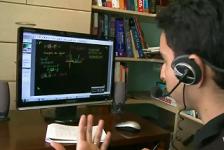Is the Khan Academy The Future of Education? (video)

Share
Will the school of the future need teachers? Probably. Will it need classrooms and textbooks? Hopefully not. To see what will replace them you only need to look to the ever expanding and educational Khan Academy. Originally developed as a means of helping his cousins with math, Salman Khan's efforts have expanded into 1800+ videos on YouTube, with nearly 22 million views between them. In these brief 10-15 minute tutorials, Khan explains basic (and not so basic) math concepts in a concise manner that students can easily digest and reference later. The academy also includes many videos on non-math topics like biology, history, and the economics of a cupcake factory. Khan Academy videos are viewed more than 70,000 times per day - that's more students than most major universities. Check out an example of Khan's work below, along with a review of the his academy from PBS's News Hour. Efforts of extraordinary individuals like Khan could revolutionize the way we teach, replacing textbooks and typical lectures with free online tutorials that students can watch at their own pace.
Education may be moving out of the classroom. According to the US Department of Education, more than 1.5 million children were home-schooled in the US in 2007. Similar trends exist around the world, and there's an even larger group of students in developing nations that lack teachers and textbooks, but may be able to access the internet (sometimes through mobile devices). In this environment, projects like the Khan Academy may be ready to thrive. They take little capital to create (Khan has made the videos on his own, and with simple graphic tools), they are widely accessible, and they can cover a wide range of topics that students need to learn. From a small investment comes a huge impact. That sort of success has attracted a lot of attention, from philanthropists like Bill Gates to media like PBS. Here's the News Hour's review of the Khan Academy:
In case you're wondering about the breadth of the topics the academy covers, here's an overview narrated by Khan himself:
And here's an example lesson on the mathematical concept of limits:
Be Part of the Future
Sign up to receive top stories about groundbreaking technologies and visionary thinkers from SingularityHub.


The Khan Academy is a not-for-profit business but it has started to experiment with generating some revenue so that Khan can expand the topics he covers and the detail in which he covers them. You can donate to the academy through the YouTube channel, you can purchase videos for download (for $1), and there are ads on some videos. According to CNN, Khan has also received major donations ($100k) from individual donors who wish to support his work. He's been able to give himself a salary, produces a few videos every day, and may be receiving a chance to expand his work with the help of Bill Gates.
Clearly, videos are no substitute for having a living human being with whom you can interact with in realtime. We are likely to always need teachers (though they need not be human) who can respond to questions and direct conversations as student's require. Textbooks, however, are another thing altogether. In the US, schools spend hundreds of dollars on books for each child. Books that are static, heavy, and limited in point of view. Imagine a future where instead of books we give students laptops and let them access a growing library of video lessons online. Non-profit organizations like the Khan academy could create these lessons online for free, or we could pay for more advanced tutorials that have interactive features and tests. Either way, students would be able to review information at their own speed and compare lessons across multiple online academies to find the approach that suits them best.
The Khan Academy isn't the only not-for-profit education provider in the world, Khan himself works with other groups, like CK12, to create his lessons. No, the Khan Academy is just an extreme example of one man revolutionizing education. In the future, we'll want to expand and generalize Khan's approach to create a larger paradigm of on-demand education. Not just for younger students, but for anyone who wants to learn. (Projects like Gapminder, which we've covered before, work to educate adults on important global data.) I'm certainly looking forward to browsing through the Khan Academy and brushing up on my cupcake economics.
[image credits: PBS News Hour]
[video credits: PBS News Hour, Khan Academy]
[source: Khan Academy, US Dept of Education (PDF), CNN]
Related Articles

Scientists Send Secure Quantum Keys Over 62 Miles of Fiber—Without Trusted Devices

This Light-Powered AI Chip Is 100x Faster Than a Top Nvidia GPU

How Scientists Are Growing Computers From Human Brain Cells—and Why They Want to Keep Doing It
What we’re reading
